Related Research Articles
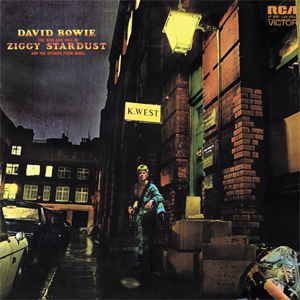
The Rise and Fall of Ziggy Stardust and the Spiders from Mars is the fifth studio album by the English musician David Bowie, released on 16 June 1972 in the United Kingdom through RCA Records. It was co-produced by Bowie and Ken Scott and features Bowie's backing band the Spiders from Mars — Mick Ronson (guitar), Trevor Bolder (bass) and Mick Woodmansey (drums). It was recorded from November 1971 to February 1972 at Trident Studios in London.
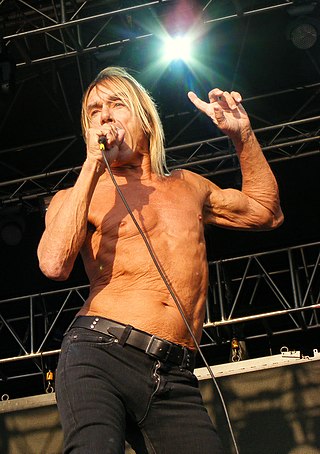
James Newell Osterberg Jr., known professionally as Iggy Pop, is an American singer, musician, songwriter, actor and radio broadcaster. He was the vocalist and lyricist of proto-punk band the Stooges, who were formed in 1967 and have disbanded and reunited many times since. Often called the "Godfather of Punk", he was named one of the 50 Great Voices by NPR. In 2010, he was inducted into the Rock and Roll Hall of Fame as a member of the Stooges. Pop also received a Grammy Lifetime Achievement Award in 2020 for his solo work.

Earthling is the twenty-first studio album by the English musician David Bowie, released on 3 February 1997 through RCA Records in the United Kingdom, Virgin Records in the United States, and Arista Records/BMG in other territories. Mostly self-produced by Bowie, it was primarily recorded from August to October 1996 at New York City's Looking Glass Studios. Bowie composed the tracks with Reeves Gabrels and Mark Plati, who are credited as co-producers, with Mike Garson, Gail Ann Dorsey and Zack Alford providing overdubs later.
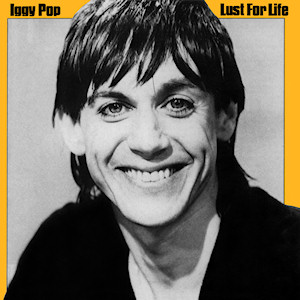
Lust for Life is the second solo studio album by the American musician Iggy Pop, released on September 9, 1977, through RCA Records. It was his second collaboration with David Bowie after The Idiot, released in March the same year. Shortly after Bowie released his own album Low in January, Pop went on a tour to support The Idiot with Bowie as his keyboardist. At the tour's conclusion, Pop and Bowie regrouped in Berlin to record the former's next solo album.

"Life on Mars?" is a song by the English musician David Bowie, first released on his 1971 album Hunky Dory. Bowie wrote the song as a parody of Frank Sinatra's "My Way". "Life on Mars?" was recorded on 6 August 1971 at Trident Studios in London, and was co-produced by Bowie and Ken Scott. Bowie's backing band consisted of guitarist and string arranger Mick Ronson, bassist Trevor Bolder, drummer Mick Woodmansey and Strawbs member Rick Wakeman on piano. "Life on Mars?" is primarily a glam rock ballad, with elements of cabaret and art rock; it has a complex structure that includes chord changes throughout. The lyrics are about a girl who goes to a cinema to escape reality, and include surreal images that reflect optimism and the effects of Hollywood.
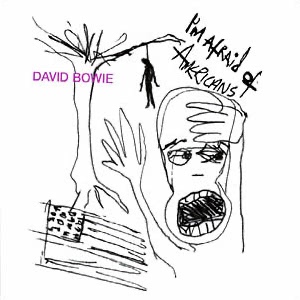
"I'm Afraid of Americans" is a song by the English musician David Bowie, released as a single from his album Earthling on 14 October 1997 through Virgin Records. The song was co-written by Bowie and Brian Eno and originally recorded during the sessions for Bowie's 1995 album Outside; this version was released on the soundtrack of Showgirls (1995). The song was then remade during the sessions for Earthling, featuring rewritten lyrics, overdubs and transposed verses. An industrial and techno track, it presents a critique of America through the eyes of a stereotypical "Johnny" and is characterised by drum patterns, synthesisers, various loops and vocal distortions.
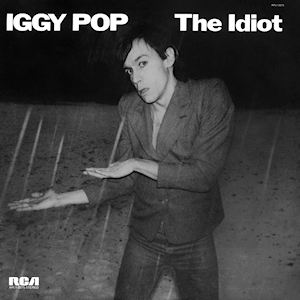
The Idiot is the debut studio album by the American musician Iggy Pop, released on March 18, 1977, through RCA Records. It was produced by David Bowie and primarily recorded at the Château d'Hérouville in Hérouville, France. The album followed the break-up of Pop's band the Stooges in 1974 and a period of drug addiction for both Pop and Bowie, after which the two moved to Europe in an effort to kick their addictions.

"Heroes" is the twelfth studio album by the English musician David Bowie, released on 14 October 1977 through RCA Records. Recorded in collaboration with the musician Brian Eno and the producer Tony Visconti, it was the second release of his Berlin Trilogy, following Low, released in January the same year, and the only one wholly recorded in Berlin. Sessions took place in mid-1977 after Bowie completed work on Iggy Pop's second solo album Lust for Life. Much of the same personnel from Low returned for "Heroes", augmented by the King Crimson guitarist Robert Fripp.
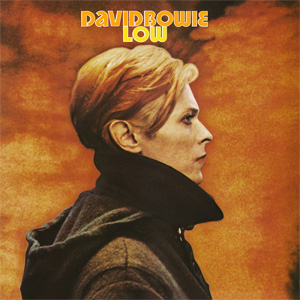
Low is the eleventh studio album by the English musician David Bowie, released on 14 January 1977 through RCA Records. The first of three collaborations with the producer Tony Visconti and the musician Brian Eno that became known as the Berlin Trilogy, the project originated following Bowie's move to France in 1976 with his friend Iggy Pop to rid themselves of their drug addictions. There, Bowie produced and co-wrote Pop's debut studio album, The Idiot, featuring sounds the former would explore on his next record. After completing The Idiot, sessions for Low began at Hérouville's Château d'Hérouville in September 1976 and ended in October at Hansa Studios in West Berlin, where Bowie and Pop had relocated.

Tonight is the sixteenth studio album by the English singer-songwriter David Bowie, released on 24 September 1984 through EMI America Records. The follow-up to his most commercially successful album Let's Dance, it was written and recorded in mid-1984 at Le Studio in Morin-Heights, Canada, following the conclusion of the Serious Moonlight Tour. Bowie, Derek Bramble and Hugh Padgham co-produced the album. Many of the same personnel from Let's Dance and the accompanying tour returned for Tonight, with a few additions. Much of Bowie's creative process was the same as he used on Let's Dance, similarly playing no instruments and offering little creative input to the musicians.
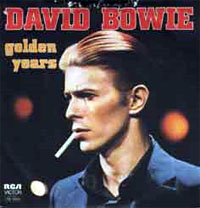
"Golden Years" is a song by the English musician David Bowie, released by RCA Records on 21 November 1975 as the lead single from his tenth studio album Station to Station (1976). Partially written before Bowie began shooting for the film The Man Who Fell to Earth (1976), the song was mostly compiled in the studio and was the first track completed for the album. Co-produced by Bowie and Harry Maslin, recording took place at Cherokee Studios in Los Angeles during September 1975. Due to Bowie's heavy cocaine use, he later recalled remembering almost nothing of Station to Station's production.
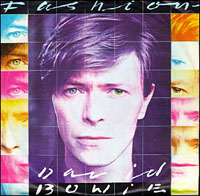
"Fashion" is a song by the English musician David Bowie from his 14th studio album Scary Monsters (1980). Co-produced by Bowie and Tony Visconti and recorded from February to April 1980 at New York and London, it was the last song completed for the album. Originating as a reggae parody titled "Jamaica", "Fashion" is a post-punk, dance and funk track structurally similar to Bowie's "Golden Years". King Crimson guitarist Robert Fripp contributed lead guitar.

The Buddha of Suburbia is the nineteenth studio album by the English musician David Bowie, originally released on 8 November 1993 through Arista Records in the United Kingdom and Europe. The project originated following an interview between Bowie and the novelist Hanif Kureishi during a press tour for Black Tie White Noise (1993), where Bowie agreed to compose music for an upcoming adaptation of Kureishi's novel The Buddha of Suburbia (1990). After making basic tracks, Bowie decided to turn the project into a full album. Working with the musician Erdal Kızılçay, recording took place at Mountain Studios in Montreux, Switzerland and was completed in six days; Mike Garson contributed piano overdubs.
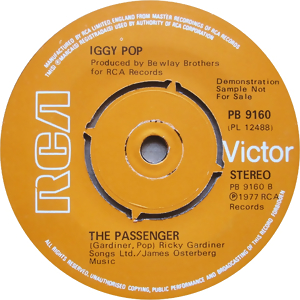
"The Passenger" is a song written by Iggy Pop and Ricky Gardiner, recorded and released by Iggy Pop on the Lust for Life album in 1977. It was also released as the B-side of the album's first single, "Success". It was released as a single in its own right in March 1998, reaching number 22 in the UK charts.

"Cat People (Putting Out Fire)" is a song recorded by the English singer-songwriter David Bowie as the title track of the 1982 erotic horror film Cat People. Bowie became involved with the track after director Paul Schrader reached out to him about collaborating. The song was recorded at Mountain Studios in Montreux, Switzerland in July 1981. Bowie wrote the lyrics, which reflected the film, while the Italian producer Giorgio Moroder composed the music.
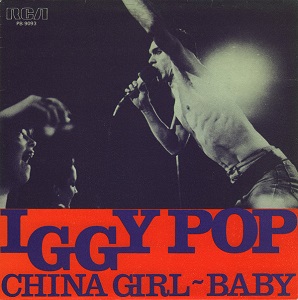
"China Girl" is a song written by Iggy Pop and David Bowie in 1976, and first released by Pop on his debut solo album, The Idiot (1977). Inspired by an affair Pop had with a Vietnamese woman, the lyrics tell a story of unrequited love for the protagonist's Asian girlfriend, realizing by the end that his Western influences are corrupting her. Like the rest of The Idiot, Bowie wrote the music and Pop improvised the lyrics while standing at the microphone. The song was released as a single in May 1977 and failed to chart.

The Berlin Trilogy consists of three studio albums by English musician David Bowie: Low, "Heroes" and Lodger (1979). Bowie recorded the albums in collaboration with English musician Brian Eno and American producer Tony Visconti. The trilogy originated following Bowie's move from Los Angeles to Europe with American singer Iggy Pop to rid themselves of worsening drug addiction. Influences included the German krautrock scene and the recent ambient releases of Eno.

"Lust for Life" is a 1977 song performed by American singer Iggy Pop and co-written by David Bowie, featured on the album of the same name. In 2004, Rolling Stone ranked it at No. 149 on their list of "The 500 Greatest Songs of All Time", re-ranking it at No. 325 in their 2021 updated list.

Kevin Armstrong is an English rock guitarist, record producer and songwriter, best known for his work with David Bowie, Iggy Pop and Morrissey.
"Silly Boy Blue" is a song written and recorded by the English singer-songwriter David Bowie. Originally demoed in 1965 as a mod-influenced track about a teenage runaway, it was revised in 1966 with new lyrics and released on Bowie's self-titled debut album in June 1967. This version reflects Bowie's fascination with Tibetan Buddhism, featuring various spiritual and geographic references in the lyrics and varied instrumentation such as a trumpet, cello and Chinese gong. Bowie remade the song twice during his stint with the Riot Squad in April 1967: as an instrumental for live performances and acoustically, which has appeared on compilations.
References
- 1 2 Easby and Oliver (2007)
- ↑ Pegg (2006), p.154
- ↑ Bianco (1998)
- 1 2 Wolk, Douglas (September 1996). "Various artists - Soundtracks (Trainspotting)". CMJ (37): 39. ISSN 1074-6978.
- 1 2 Ehrlich (1997), p.96
- 1 2 Paul Trynka (2011), Iggy Pop: Open Up and Bleed: The Biography, p. 145, Hachette
- 1 2 Rule, Greg (April 1994). "Trent Reznor". Keyboard .
- 1 2 Pegg 2000, pp. 152–153.
- ↑ DeCurtis, Anthony and James Henke and Holly George-Warren (1992), p. 378
- ↑ Jennings and Gardner (2012)
- ↑ Ramirez, Carlos (February 5, 2021). "Damien Done Goes "Nightclubbing" on Iggy Pop Cover (Premiere)". No Echo. Archived from the original on February 5, 2021. Retrieved February 16, 2022.
- 1 2 Perry, Kevin (May 26, 2020). "The perfect marriage: why Iggy Pop and David Bowie's Berlin year inspired the new breed of punks". NME . Archived from the original on June 13, 2020. Retrieved February 18, 2022.
- ↑ Marvilli, Joe (January 31, 2010). "Watch: Trent Reznor and Peter Murphy cover Iggy Pop, The Normal, NIN". Consequence of Sound . Archived from the original on February 18, 2022. Retrieved February 18, 2022.
- ↑ Howard, Tom (May 20, 2019). "The Masterlist – every song Oasis ever recorded ranked in order of greatness". NME . Archived from the original on May 20, 2019. Retrieved February 18, 2022.
- ↑ Powrie, Phil and Robynn Jeananne Stilwell (2006), p.134
- ↑ Writers: Crouse, Karrie. Nolan, Jonathan. Director: Foerster, Anna. (April 12, 2020). "Genre". Westworld. Season 3. Episode 5. HBO.
- ↑ Renfro, Kim (April 12, 2020). "'Westworld' cocreator Jonathan Nolan breaks down Sunday's 'Genre' episode and the inspiration for each movie theme". Insider . Archived from the original on February 15, 2023. Retrieved April 12, 2020.
Sources
- Bianco, David P. (1998). Parents aren't supposed to like it: rock & other pop musicians of the 1990s . U X L. ISBN 0787617326.
- DeCurtis, Anthony; James Henke; Holly George-Warren (1992). The Rolling stone album guide: completely new reviews : every essential album, every essential artist. Random House. ISBN 0679737294.
- Easby, Amber & Henry Oliver (2007). The Art of the Band T-shirt. Simon and Schuster. ISBN 978-1416947554.
- Ehrlich, Dimitri (1997). Inside the music: conversations with contemporary musicians about spirituality, creativity, and consciousness. Shambhala. ISBN 1570622736.
- Jennings, Ros & Abigail Gardner (2012). 'Rock On': Women, Ageing and Popular Music. Ashgate Publishing. ISBN 978-1409428411.
- Pegg, Nicholas (2006). The complete David Bowie. Reynolds & Hearn. ISBN 1905287151.
- Pegg, Nicholas (2000). The Complete David Bowie.
- Powrie, Phil & Robynn Jeananne Stilwell (2006). Changing Tunes: The Use of Pre-existing Music in Film. Ashgate Publishing. ISBN 0754651371.
- Paul Trynka (2011). Iggy Pop: Open Up and Bleed. Crown Publishing Group. ISBN 978-0767927222.